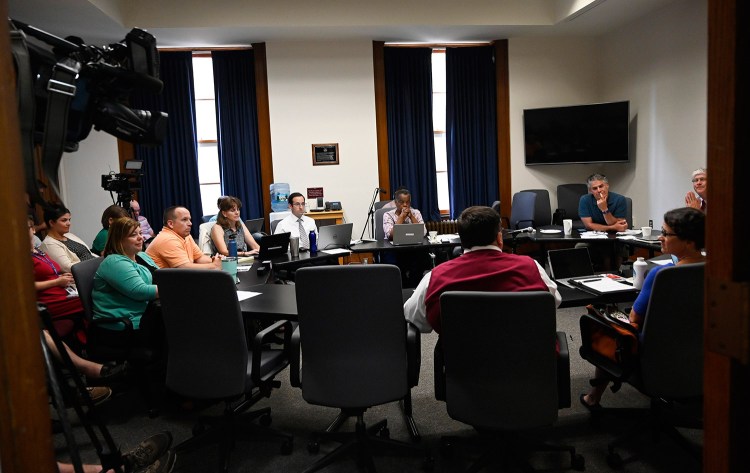A City Council committee voted unanimously Thursday to make the initial housing costs for dozens of migrant families currently staying in a temporary shelter the top priority for expending $870,000 in private donations.
City Manager Jon Jennings said he’d like to use most of the donations to help pay move-in costs for when families are placed in housing. Those costs could include first month’s rent, security deposits and utility activation fees.
“The highest priority is making sure there’s available funding to make sure people are housed,” Jennings said. “Second would be assistance for nonprofit partners. And third would be to seek some level of reimbursement for the city.”
Jennings said the city also would look to recoup expenses associated with setting up and operating an emergency shelter at the Portland Expo that were above and beyond normally budgeted items.
However, the city would not tap into the donation fund until it knows whether it will receive any of the $30 million in federal funding allocated to help communities like Portland that have been impacted by the surge of asylum seekers at the southern U.S. border.
The Finance Committee also recommended using some of the donations to reimburse nonprofit groups that have been helping to provide food, translation, legal and other services at the shelter since it opened June 9, and will do so until it is slated to close, Aug. 15.
The city could use remaining donations to help pay for additional General Assistance costs in other municipalities where asylum seekers are being housed, as well as providing extra assistance for things like transportation and possibly even cellphones.
City officials are closely watching the state rulemaking process around Gov. Janet Mills’ emergency rule change aimed at making all of the recent asylees eligible for the General Assistance program, which provides vouchers for housing, food and other basic necessities.
The state reimburses municipalities for 70 percent of those costs and the municipalities cover the rest. Jennings said Portland may use any excess donations to help other communities pay their 30 percent of GA costs.
Immigration advocates on Thursday warned that while the Mills administration has good intentions, the new rules would still leave some people ineligible for General Assistance, including victims of sex trafficking. Although city officials hope the expansion of GA eligibility by the state will eliminate the need to tap a previously established Community Support Fund, advocates urged councilors to keep the taxpayer-financed assistance in place until the state rules are finalized to ensure everyone in need is covered.
“Until the rule is made final we need to make sure that (Community Support Fund) is fully funded,” said Frank D’Alessandro, litigation and policy director for Maine Equal Justice Partners.
The Finance Committee’s recommendation will go to the City Council on Aug. 12.
City Finance Director Brendan O’Connell said in a memo to the Finance Committee that the city has raised over $900,000 in private donations from over 4,000 people since the migrants began arriving in Portland on June 9. The city has about $870,000 in hand and the balance is in pledges.
Nearly $590,000 in donations have been made by Maine residents from 226 municipalities, O’Connell said. Over $173,000 in donations came from Portland residents.
The money from the donations would not be deposited in the Community Support Fund, which currently has a balance of $180,000, because the uses are restricted. But that would not prohibit the city from infusing that fund with donations at a later date if needed.
O’Connell said that in recent weeks the city has incurred nearly $200,000 in expenses associated with sheltering asylum seekers at the Expo. That includes about $115,000 that was not included in the current budget for additional staff and services through July 12 for the unexpected arrival of more than 300 migrants, he said.
Jennings said donations would not be used for costs associated with normal city operations.
Assistant City Manager Heather Brown said the city may be eligible to receive some of the $30 million in federal funding attached to a border security bill, which is being administered by the United Way, to pay for some of those costs.
Brown said the city soon should know about whether it’s eligible for the federal funding, since the Federal Emergency Management Agency funds must be appropriated and spent by the end of the federal fiscal year, which ends Sept. 30.
Councilors said they supported making housing costs a priority, while also giving Jennings the flexibility to use the money as needed. Jennings said he would produce a monthly report about how the city is allocating the funding.
“I very much want the appropriation resolve to be as broad as possible,” Councilor Justin Costa said. “(But) I’m going to be very upset if we start spending tens of thousands of dollars on transportation and run out of money to house people.”
Send questions/comments to the editors.




Success. Please wait for the page to reload. If the page does not reload within 5 seconds, please refresh the page.
Enter your email and password to access comments.
Hi, to comment on stories you must . This profile is in addition to your subscription and website login.
Already have a commenting profile? .
Invalid username/password.
Please check your email to confirm and complete your registration.
Only subscribers are eligible to post comments. Please subscribe or login first for digital access. Here’s why.
Use the form below to reset your password. When you've submitted your account email, we will send an email with a reset code.